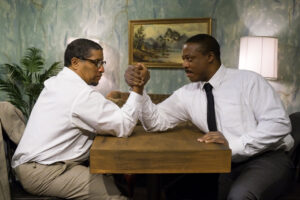About
Posted at TimesofSanDiego.com on 3/2/21
RUN DATES: 2/26/21 – 3/13/21
VENUE: Streaming from Point Loma Playhouse
In an arm-wrestle challenge between civil rights icons Martin Luther King and Malcolm X, who do you think would win?
If your curiosity is piqued, you should check out “The Meeting,” Jeff Stetson’s 1987 hypothetical drama.
The two greats never really had a strength-competition, or even a conversation. They only crossed paths once, when they were both in Washington D.C. to watch the Senate debates on the (eventual) passing of the Civil Rights Act of 1964. There was just enough time together for someone to snap a photo, and then, as always, they went their separate ways.
Stetson, whose one-act has been produced in all 50 states and a dozen foreign countries, sets the play on Valentine’s Day, 1965.
It’s the day that Malcom’s home in Queens was firebombed, and a week before Malcolm would give his famous address to the Organization of Afro-American Unity at the Audubon Auditorium. That’s the day he was assassinated by three members of the Nation of Islam, who were angered by his renunciation of the group.
Three years later, in April 1968, Dr. King was shot and killed at a Memphis motel, by a segregationist white man. Mystery, uncertainty and conspiracy theories continue to surround both murders.
At the time of their death, each of these men was approaching his 40th birthday.
So, these two young influencers, in the prime of their lives and careers, come together in a Harlem hotel at Malcolm’s invitation. They couldn’t be more different, and they arrive at the meeting with vastly different expectations.
They start out wary, each convinced of the rightness of his approach to the racial struggle of his people. Martin is a Baptist minister, a pacifist committed to Gandhi’s philosophy of non-violence. Malcolm, more cynical and aggressive, is a street-bred, self-educated proponent of black power and self-defense, by violence when necessary.
Over the course of their brief (imaginary) meeting, in discussions of their political, religious and philosophical beliefs, as well as their children and their fears, and yes, not one but three arm-wrestles, they come to a place of mutual respect. And they seem to realize what they might have accomplished if they’d worked together. If only…..
The play is often more educational than dramatic, though there’s an undertone of tension that keeps us engaged. And the third character, Rashad, Malcom’s staunchly protective bodyguard (Julian King Monroe), heightens the unease, and the potential for a less than peaceful resolution.
The filmed Point Loma Playhouse production, directed by Jerry Pilato, is perfectly timed to this moment of extreme racial conflict, and to Black History Month.
It begins with archival footage of horrendous anti-black violence, a lynching and a King speech, all of which turns out to be Malcolm’s nightmarish dream, though it was played out on the streets of America (and still is) on a regular basis.
Like the arm-wrestle, a chess-set is also symbolic. Malcolm and Rashad (who always beats him) discuss the black and white pieces, and the pawns that Malcolm always protects, though Rashad insists that it’s most important to protect the leader. “You can’t sacrifice your own people and win,” Malcolm says. “We’re all pawns, Rashad.”
Perhaps it was my laptop or my wifi connection, but I had trouble with the sound throughout. Whenever the dynamic twosome lowered their voices, their words were hard to discern. But they were performing on an actual set, with a couch, table and chairs, all three of the performers in the same space. That’s so refreshing to see in these Zoombified times.
The performances are potent. As Malcom, Rhys Greene exhibits the fire, the edginess, the fatalism, though he overplays his hand at times. As Martin, J. Kay Weldon maintains a calm, measured voice and demeanor. No fire and brimstone; he’s not preaching here. His intention was to offer solace and comfort to a man who’d just lost his home.
They dance around each other: “Aggression in the name of self-defense is not aggression,” says Malcom. “It’s honor. When the music is tango, we tango.” Fortunately, that metaphor never becomes literal, but there’s a bit of fancy footwork required to get to the conciliatory ending.
“The Meeting” is a powerful reminder of where we’ve come from and where we are (not so very far, in many ways). But that realization can serve as a call to action, or at least to dialogue and sensible discourse. If only….
©2021 PAT LAUNER/Patté Productions, Inc.





